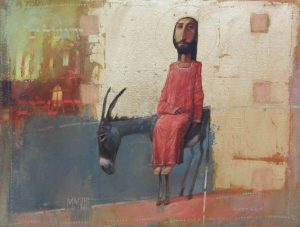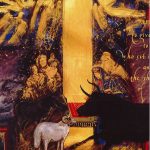Christmas 2018
Luke 2:8-16
Chris Tyack
1.
We hear again of the shepherds and the angels—a story thick with sentiment for many of us. We heard it as children. We hear it again as adults, trying to recapture some of its original glory, its strangeness, its mystique.
Suddenly there was with the angel a multitude of the heavenly host, praising God and saying ‘Glory to God in the highest heaven, and on earth peace’.
It has something of the storybook about it; it has an imaginative feel. We who live in this most cynical and literal of times—perhaps we really are thirsting for tidings of great joy.
We who live in a world that is time-poor, and geared to production–we who live in a world that seems more and more bureaucratic, do we yearn to hear again the message of the angels?
We who seem to have forgotten community, sharing, and gratitude, do we yearn to hear again the rumour of Immanuel, the God who is with us?
We who suffer a strange crisis of memory—inhabiting the world that once was, yet now somehow evacuated of its many stories—perhaps we need these tidings more than ever.
Even in the secular city, the angelic voice sounds from afar. It comes to us in our dreaming, in our hope for a better world. It surprises us with joy.
2.
 Christmas still has power to enchant us, even as adults, because it promises a spiritual renewal. We remember that life is about more than mere toil. Work satisfies our material needs, undoubtedly; but we have other needs, spiritual needs. And our spiritual lives are nurtured by rest and festival and, yes, friendship and story and music. If we would be balanced people, we need sociality and imagination.
Christmas still has power to enchant us, even as adults, because it promises a spiritual renewal. We remember that life is about more than mere toil. Work satisfies our material needs, undoubtedly; but we have other needs, spiritual needs. And our spiritual lives are nurtured by rest and festival and, yes, friendship and story and music. If we would be balanced people, we need sociality and imagination.
We need to keep festival.
The philosopher Josef Pieper says in Leisure, the Basis of Culture (1952) that
In leisure, one celebrates the end of work by allowing one’s inner eye to dwell for a while upon the reality of the creation. Look and affirm: it is good. Now the highest form of affirmation is the festival; among its characteristics, Karl Kerényi tells us, is “the union of tranquility, contemplation, and intensity of life.” To hold a celebration means to affirm the basic meaningfulness of the universe and a sense of oneness with it, of inclusion within it. In celebrating, in [feasting], one experiences the world in an aspect other than the everyday. The festival is the origin of leisure, and the inward and ever-present meaning of leisure. (p.48)
We keep festival. See, the joyful faces of children, the food that is shared! The gentle experience of human presence!
We celebrate the entwinement of our lives, one with another: and we become more than the sum of our parts. In our midst is a magnetism, a Presence: it is not a merely naturalistic phenomenon. It is social bond, our life, our witness, our memory. We draw near to God, who is in our midst. That is why we keep festival. And the praise of God, says Josef Pieper, is festival in its most intense form (p.65).
3.
 We live in a secular society, a disenchanted society.
We live in a secular society, a disenchanted society.
Yet the rumour of God persists, even now. The story of Christmas is still told among us. We tell it as adults, we told it as children; it is woven through our lives like a golden thread.
For us who keep the festival, the incarnation goes on. As John Betjeman said, we rejoice—
That God was man in Palestine
And lives today in Bread and Wine.
Christ lives in us.
Christ lives in us, the food and drink of our common life.
So you see, Christmas continues, all year. Christ comes to birth. All year we can live in this happy light; and so we are a people of trust, of hope, and of love. I believe this is the deepest answer to secular disenchantment.
And so we come to the mystery of the Church itself—
We are the body of Christ! His Spirit is with us!
Amen.
https://annunciation.org.au/sermons/great-with-child/

